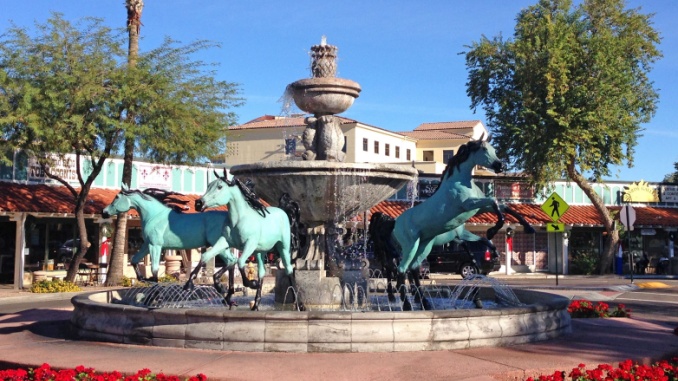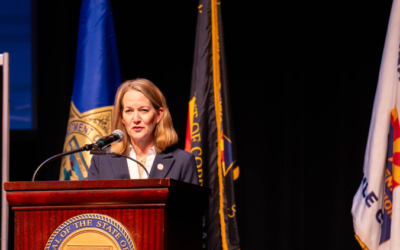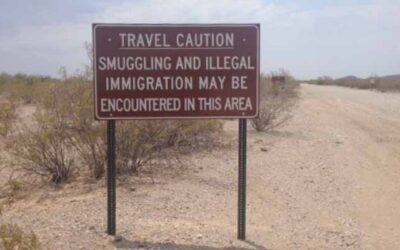By Staff Reporter |
The city of Scottsdale unanimously held off on approval of a sustainability plan during Tuesday’s regular council meeting after mass backlash from citizens.
The plan, in the works since 2021, is part of an implementation of the voter-approved General Plan 2035, and the city’s 2022 and 2024 Organization Strategic Plans. Arizona State University (ASU) Walton Sustainability Solutions Service (WSSS) and the Scottsdale Environmental Advisory Commission (SEAC) played roles in getting the sustainability plan together.
Lisa McNeilly, the city’s sustainability director since 2022, gave the presentation on the proposed plan during Tuesday’s meeting. McNeilly was formerly the sustainability director for the city of Baltimore, Maryland from 2017 to 2022, and UC Berkeley from 2008 to 2017. Prior to those roles, McNeilly served as director of international programs for the Pew Center on Global Climate Change (now the Center for Climate and Energy Solutions), and special assistant for President Bill Clinton’s White House Climate Change Task Force.
McNeilly said that Scottsdale’s sustainability plan — focused on energy, water, waste, air quality, and extreme heat — would not only benefit the environment but afford cost savings, health and safety improvements, and economic vitality.
The five-point framework of the plan focuses on energy, water, waste, air quality, and extreme heat.
Energy targets included reducing citywide and municipal electricity use, citywide and municipal greenhouse gas emissions, and the average energy burden for all households; increasing distributed solar capacity both citywide and municipally, and the percentage of “green” buildings.
Strategies to meet these energy targets focused on reducing energy use and greenhouse gas emissions, improving municipal energy performance, and reducing energy impacts of the built environment through sustainable building practices and policies.
Water targets included reducing residential, municipal, HOA irrigation, and commercial water use; increasing return flow percentage; maximizing annual water banking; and maintaining treated groundwater deliveries to Safe Yield levels.
Strategies to meet these water targets focused on ensuring water system resiliency and reducing municipal water usage.
Waste targets included reducing single-family household, citywide, and municipal landfill refuse; achieving diversion rates ranging from 35 to 90 percent across homes, the city, and municipalities; increasing the percentage of recycling; achieving the diversion rate of brush and bulk waste stream; diverting 30,000 tons annually of citywide organic waste from the landfill; and achieving a recycling contamination rate below five percent.
Strategies to meet these waste targets included increasing diversion rates, strengthening local markets for recycled content, expanding opportunities for diverting organic waste from the landfill, and reducing waste generation.
Air quality targets included reducing unhealthy air days, illnesses for pollution-related health events, and municipal fleet fuel use; and increasing the number of publicly available electric charging ports.
Strategies to meet these air quality targets included “cleaning” the city’s air and supporting adoption of electric and other alternative fuel vehicles.
Extreme heat targets included reducing average July daytime and nighttime temperatures, average surface temperatures, and illnesses for heat-related health events; and increasing tree and shrub canopy.
Strategies to meet these extreme heat targets included expanding heat relief communication and education, protecting people from the health effects of extreme heat, identifying urban design improvements including structured shade and built environment, and planting more trees along with the implementation of other nature-based solutions.
McNeilly emphasized that the plan wouldn’t be enforced through any current or future mandates. It’s unclear to what degree this clarification measures up to a promise: in 2022, the city mandated a “Green Construction Code” for commercial and multifamily buildings that, just a decade earlier, had come into play as a voluntary incentivized option.
The city’s plan didn’t estimate exact costs for the actions and strategies, instead assigning three potential cost ranges to each: up to $50,000, from $50,000 to $250,000, and over $250,000.
During public comment on the proposed plan, Scottsdale residents expressed disdain for the plan.
Austin Fairbanks, a senior research analyst in the State House, said that the plan would have minimal impact on the climate compared to the fiscal and quality of life costs imposed on residents.
Fairbanks said that even if 100 percent of all new Scottsdale buildings went “green” in their construction going forward, the city would only achieve “green” for 8.8 percent of all buildings at the current pace, below the goal of 10 percent — which Fairbanks estimated would come at a cost of $90 million.
“Those are just two examples where logic and fiscal prudence were thrown out the door to accommodate this Green New Deal-style agenda,” said Fairbanks. “We’re told this is an aspirational document, but if you were to adopt this plan, it would be a policy standard for the council and staff that you want to meet these goals. And the easiest ways to achieve those goals is by increasing fees and imposing costs and mandates.”
Fairbanks said that Scottsdale contributed 0.00067 percent of all global greenhouse gas emissions: even if the city reached its goal of a 90 percent reduction threshold, it would impact less than seven-millionths of total greenhouse gas emissions. Fairbanks estimated that the cost to nearly eliminate greenhouse gas emissions, though not given by the city in its proposed plan, would amount to $280 million for taxpayers.
“Trying to socially engineer residents to reduce greenhouse gas emissions at a total of seven-millionths of the total is the wrong approach,” concluded Fairbanks.
Jim Davis with the Coalition of Greater Scottsdale (COGS) expressed concern that fiscal stability wasn’t prioritized enough by the city in its approach to implementing a sustainability plan. Davis urged the council to focus on boosting tourism, and to back off on high-density residential units due to their low revenue and negative impact on city attractiveness.
“The city is underinvesting in its assets. COGS believes the city is not sustainable,” said Davis.
However, COGS board of directors member Sonnie Kirtley said through a submitted written statement their organization supported the sustainability plan.
Councilman Tom Durham said that the plan was “critical” to Scottsdale’s future. Durham characterized public discontent with the plan as a reticence to pay for the sustainability goals. The councilman said it was “misinformation” that the city would introduce mandates to support its sustainability goals.
“People say we can’t do anything, but we have to: it’s part of our commandment,” said Durham. “Some people thrive on disinformation and finding the government boogeyman behind every door, and we all recognize that’s for political purposes, much of it.”
Councilwoman Betty Janik said that sustainability was nothing to do, and that this new plan was just a continuation of the same direction they’d been heading down. Janik compared the city’s sustainability plan to major invention breakthroughs in history that weren’t preceded by proof of concept: Alexander Fleming’s discovery of penicillin, American astronauts walking on the moon for the first time, and AIDS treatments.
“We cannot force [the sustainability plan] on you, it’s something you have to accept and believe in,” said Janik.
Councilman Barry Graham said he didn’t appreciate his fellow council members “casting aspersions” on the residents, such as calling them “keyboard warriors.” Graham said the plan went too far and was both contradictory and vague in its proposals: significant water reduction for residents while planting more trees, and a lack of specificity regarding costs of all goals.
“We’ve gotten hundreds of emails from residents who are confused or find elements of the plan extreme,” said Graham.
Councilwoman Kathy Littlefield expressed concerns about the “unintended consequences” of the actions proposed, namely the greater cost for citizens for less access to utilities and city services, such as water, waste, and power.
“Since when have we as citizens given the city the kind of power or right to monitor our homes and businesses and our lives to this kind of extent?” said Littlefield.
Littlefield noted that she has never seen such a unanimous, overwhelming rejection by the citizens of an issue as the sustainability plan. Out of hundreds of emails, Littlefield said she only received two in support of the plan.
Councilwoman Tammy Caputi said that citizens were missing the “point of the plan.” Caputi insisted that no mandates would come from the plan. She expressed confusion at the community resistance to the plan, saying she felt she hadn’t heard of this mass resistance before in the past two years of the plan’s development.
Mayor David Ortega stressed that the sustainability plan would be important to implement for Scottsdale’s future wellbeing. Ortega said that the city was running out of its resources and bearing a greater cost for them: landfills for waste, water, energy, and clean air.
The city’s presented sustainability timeline, stretching back to 1967, included the major policy changes and actions undertaken in recent years, such as the banning of natural grass in new single-family homes and addition of solar infrastructure last year; the mandate of a Green Construction Code in 2022; and the approval of the 2035 General Plan in 2021; the installation of LED streetlights in 2020.
AZ Free News is your #1 source for Arizona news and politics. You can send us news tips using this link.








